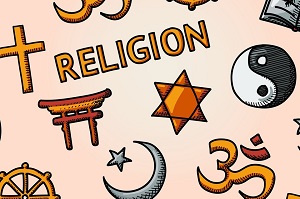Mathias Rohe debates: Religions as Fire Accelerants?
Just how peaceful is religion? In a debate with the German newspaper Nürnberger Nachrichten, Mathias Rohe, director of EZIRE, debates the violent potential of Islam and Christendom together with Tarek Badawia, professor for Islamic-Religious Studies and Islamic education at FAU, and Stefan Ark Nitsche, regional bishop of Nuremberg.
Taking the most recent turning point in the Middle Eastern conflict, that is, U.S.president Trumps decision to move the U.S. embassy from Tel Aviv to Jerusalem, Islam scholar Rohe shows the negative mobilization potential of religion. Even though the Trumps Jerusalem-decision had been motivated by domestic politics, religious fundamentalists on all sides had been afloating again. Here, Rohe also criticizes the term “Holy land”: For when ruling demands were religiously charged, they quickly became “unholy”: Due to the try of fulfilling one’s own message of salvation, demands of others became unacceptable. Furthermore, Rohe constantes that within all parties of the Middle East conflict, the acceptance to tolerate positions of the respective counterparties had steadily declined. The religious charging of the conflict is what troubles Rohe the most: For nobody differentiated any longer between the conflict on the one hand and distrust against Jews in general. This was also felt by Jewish communities in Europe which were held responsible for Israels political actions.
The general characterization of Christendom as a peaceful religion in comparison to a presumably violent Islam, which was repeatedly carried to Rohe in discussions, was misguided. A development to non-violence could only be observed in the Christian denominations in Western Europe. Orthodox confessions in Eastern Europe, however, were a different case: During the Yugoslav war, for instance, Serbian bishops had called for a “Holy War” on Muslims. In the Russian clergy, there were voices that approved the use of violence. And the Catholic radio station Maryja in Poland was no voice of peace, either. According to Rohe, problems occured in every religion as soon as its legitimate truth claim was combined with a claim to power over societal life.
In the course of debate, Rohes colleague Badawia calls for a de-politicization of Islam in the German education system. To achieve this, Muslims in Germany had to decide upon questions of religious authority and interpretational sovereignity of Islamic primary sources. A sufficient platform might be an Islamic Council, that transfered the results of the debates to the public. Rohe supports this approach and justifies the current, step-by-step procedure: Germany had been acting wisely by setting up platforms where Muslim debates could tak place, he says. One had to face this sorting process of Muslim communities in Germany, which Rohe describes as “Grassroots Movement”. However, the Islamic scholar emphasizes: “What we will not become is a binding teaching canon of a singular Muslim organization, which […] will furthermore be infallibly”. The aim was not to set up a “clean State-Islam” but to “distill the greatest stock of joint beliefs, and to elaborate mechanisms on how to peacefully live with differences”. This opportunity for developments was a big chance for Muslims, which they also took, Rohe summarizes optimistically.
In the end of the debate, the EZIRE director once more points out that violent behaviour was not restricted to religions – secular ideologies had also shown their violent potential in the course of history. More decisive than the label were the contents. Keeping societal plurality in mind, it was necessary to develop consent. But it did not matter if this consent was motivated ethically or religiously. Humans needed an explanatory system and religions could play a positive role here.
